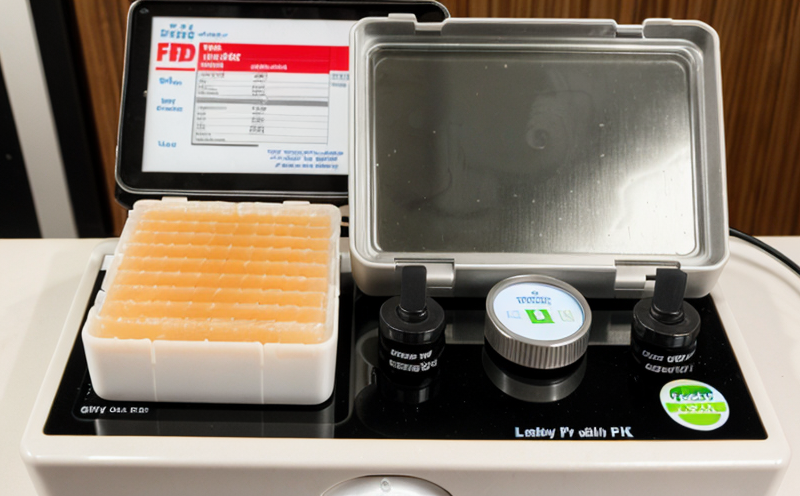ISO 34562 Lipid Oxidation Testing in Snack Foods
The challenge of lipid oxidation in snack foods is a critical concern within the food and feed testing sector. This process, often initiated by exposure to air, light, heat, or metal, leads to the deterioration of fats and oils present in snacks. Lipid oxidation not only affects product quality but also impacts shelf life, taste, texture, and ultimately consumer satisfaction. Proper management of lipid oxidation is essential for maintaining food safety standards and enhancing product quality.
The ISO 34562 standard provides a robust framework to quantify lipid oxidation through the measurement of peroxide value (PV), anisidine value (AV), and other key indicators. These parameters help in assessing the extent of oxidative stress on fats and oils within snacks, thereby allowing for informed decisions regarding processing conditions, packaging materials, and storage durations.
Our service utilizes advanced analytical techniques such as gas chromatography coupled with mass spectrometry (GC-MS) to provide precise measurements. The GC-MS method offers high sensitivity and selectivity, ensuring accurate quantification of specific lipid oxidation products. This approach is particularly beneficial for identifying early signs of oxidative stress that could otherwise go unnoticed.
For our clients—quality managers, compliance officers, R&D engineers, and procurement professionals—the ability to monitor lipid oxidation in snacks provides a competitive edge by enabling proactive adjustments to manufacturing processes. By adhering to international standards like ISO 34562, we ensure that all test results are reliable and can be trusted for regulatory compliance.
Our service includes a comprehensive approach from sample preparation through to final analysis and reporting. Sample preparation involves meticulous homogenization of snack samples to achieve representative testing material. This step is crucial as it ensures that the lipid oxidation assessment reflects the true condition of the product across its entire batch.
The analytical process itself employs state-of-the-art equipment, including GC-MS systems, ensuring precise measurement and identification of lipid oxidation products. Post-analysis, detailed reports are generated highlighting key metrics such as peroxide value (PV) and anisidine value (AV). These reports provide actionable insights for enhancing product quality and extending shelf life.
Understanding the real-world implications of this testing is equally important. For instance, a high PV indicates significant lipid oxidation, which could lead to rancidity and off-flavors in snacks. Monitoring these values regularly allows manufacturers to make timely adjustments, ensuring that products remain fresh and appealing until their expiration dates.
- Quality Assurance: Ensures compliance with international standards, enhancing product safety and reliability.
- Process Optimization: Identifies areas for improvement in manufacturing processes to reduce lipid oxidation.
Eurolab Advantages
At Eurolab, we pride ourselves on offering unparalleled expertise and cutting-edge technology tailored specifically to the needs of our clients. Our team of highly qualified professionals brings decades of experience in food science and analytical chemistry, ensuring accurate and reliable testing results.
We leverage a wide array of advanced instrumentation including GC-MS systems, HPLC instruments, and other relevant equipment to provide precise measurements and comprehensive analysis. This ensures that our clients receive data that is not only accurate but also actionable for their specific needs.
Our facilities are ISO/IEC 17025 accredited, reflecting our commitment to quality assurance and reliability in every test we conduct. This accreditation guarantees that all testing procedures meet international standards and provide results that can be trusted both internally within your organization and externally with regulatory bodies.
We offer a range of additional services beyond just lipid oxidation testing, including allergen detection, mycotoxin analysis, and nutritional profiling. Our diverse service offerings allow us to support various aspects of food safety and quality management across different segments of the industry.
Quality and Reliability Assurance
- Compliance with ISO/IEC 17025 standards ensures that all tests are conducted under controlled conditions, yielding consistent results.
- Use of advanced GC-MS technology guarantees precise measurement and identification of lipid oxidation products.
The strict adherence to international standards such as ISO 34562 not only enhances the accuracy of our tests but also ensures that they are recognized globally. This is particularly important for companies operating across multiple jurisdictions, where compliance with local regulations is crucial.
Our rigorous quality control measures include regular calibration and validation of all instruments used in testing. This ensures that every measurement taken aligns perfectly with industry benchmarks, providing confidence in the reliability of our findings.
We also maintain detailed records of all test procedures and results, which are available for review upon request. These records serve as a valuable resource for ongoing quality improvement initiatives and can be used to identify trends over time that may indicate areas needing attention or optimization.
Customer Impact and Satisfaction
- Precise measurement of lipid oxidation helps in maintaining product freshness, thereby enhancing consumer satisfaction.
- Accurate quantification supports informed decision-making regarding ingredient sourcing and processing methods.
By providing detailed reports on lipid oxidation levels, we empower our customers to make data-driven decisions that positively impact their products. This can lead to improved product quality, extended shelf life, and increased customer loyalty due to consistently high-quality offerings.
The insights gained from this testing also contribute significantly to the development of new snack food products tailored to meet evolving consumer preferences while ensuring safety standards are met or exceeded.
Our commitment to excellence extends beyond just technical accuracy; it includes providing personalized service and support throughout every stage of the testing process. From initial consultation to final report delivery, our goal is to ensure that our clients feel confident in their choices regarding food quality assurance practices.





